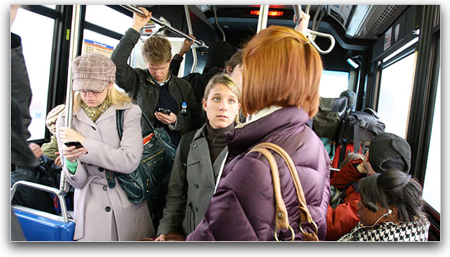Last spring, I was traveling on a public bus from Laguardia Airport in New York to my hotel on the north side of Manhattan. When I got on the bus at the airport, the bus driver was in a heated argument with someone complaining about being charged twice for the ride. The bus driver was clearly not amused and went from zero to outrage in ten seconds. Trying not to be his next target, I smiled, paid, and sat down in the first open seat.
For the next 30 minutes, I watched the driver mumble under his breath and shake his head in a perpetual state of anger. Each new passenger who entered the bus needed to only glaze quickly into the driver’s eyes to see he was not happy.
The bus made its way into Harlam at about the same time the local high schools were getting out. I was worried about mixing an angry driver with agitating teens. At the first stop in Harlam, two teens jumped on the bus with big smiles and extended a ribbon-tied rolled-up piece of paper toward the driver.
Congratulations! For all the hard work you do on Bus Route M60, you’ve been awarded the Platinum Honorary Certificate of Greatness!
The driver didn’t grab the paper, so the teens placed it on the dashboard and then jumped back to the sidewalk and darted down the street. Visibly annoyed, the driver closed the door and drove on.
A few streets later, we stopped at a red light. The driver used the pause as an opportunity to reach, untie and open the rolled certificate. Impressively, the certificate used fancy Letterpress printing, color images and even had a foil circle stamp at the bottom. I couldn’t make out all the text, but at the top, it read,
The Platinum Certificate of Greatness is Awarded to Members of Society Who Demonstrate a Commitment to Making Our Lives Better.
I watched as the driver laughed under his breath and then cracked a smile. It was like a magic spell was released when he opened the certificate because, from that moment forward, his attitude totally changed.
A taxi behind us laid on his horn because the light had switched to green several seconds prior. The bus driver calmly said, “ok, ok. I’m moving.”
Amazing! Ten minutes ago he probably would have gotten off the bus to physically engage the taxi driver. When new people entered the bus, he welcomed them with a smile, which inspired the new bus riders to grin back.
I sat there in awe as the entire culture of the bus changed. People started smiling, laughing, and talking.
It’s amazing how such a simple act targeted at exactly the right person can have such a large impact on the entire community.
The bus driver was a network node for the community. A node in that he connected with hundreds of people on his route throughout the day. His positive or negative attitude was contagious to the people he came in contact with and it set the tone for the culture of the bus.
Teachers and staff members are network nodes for college campus communities. They come in contact with hundreds of students throughout the day. If the teacher or staff member is in a bad mood, that feeling can be contagious to the students he/she comes in contact with.
As we talk about engaging and growing the college community, let’s not forget about the teachers and staff members as the network nodes. What can we do to engage them more? Very few student activities’ departments we work with having a formal plan on how to engage teachers and staff members. Teachers and staff members are very much a part of the campus culture and shouldn’t be ignored.
The other interesting idea that stemmed from this situation is why would the teens bother to take the time to create such a fancy certificate, wait for the bus to arrive, present it to the bus driver and then run away and not see the end result of their effort? Some might answer that they did it for laughs or for fun or as a dare or class project. All of which might be true, but there is something bigger at play here; the teenagers’ tiny actions had a huge impact on the community’s reciprocal social capital.
As author Robert Putnam of Bowling Alone defines it:
I’ll do this for you now, without expecting anything immediately in return, and perhaps without even knowing you, confident that down the road you or someone else will return the favor to either me or someone else in the community. A well connected person in a poorly connected society isn’t as productive as a well connected person in a well connected society.
More on the concept of reciprocal social capital and why and how you can create it in your community in my next post. Now get back to work!





